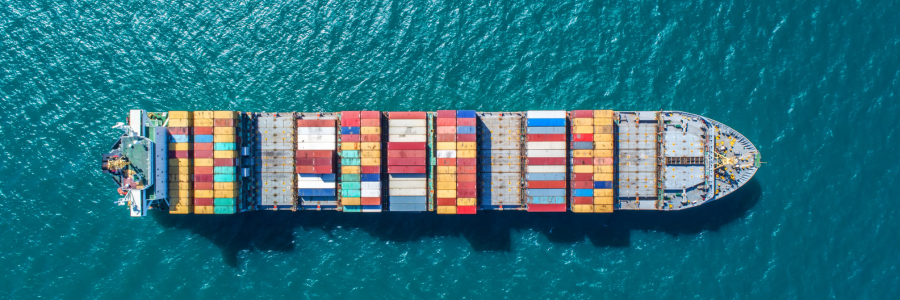The world of freight forwarding is evolving, with sustainability at the forefront of changes in both maritime and airfreight sectors. As we move into 2024, several trends are emerging, signaling a significant shift towards more eco-friendly practices in the logistics industry.
Let’s delve into these trends to gain insights for freight forwarders on what to expect and how to adapt.

Maritime Freight Sustainability Trends
Increased Use of Low-Emission Fuels
In 2024, we'll see a more pronounced shift towards low-emission fuels in maritime transport. Traditional heavy fuel oils are being replaced by liquefied natural gas (LNG), biofuels, and, in some cases, hydrogen-based fuels. These alternatives significantly reduce greenhouse gas emissions, and their adoption is being driven by stricter environmental regulations imposed by the International Maritime Organization (IMO) and a growing commitment to sustainability from shipping companies.
Investment in Electric and Hybrid Vessels
Electric and hybrid technologies, which have already made their mark in the automotive industry, are gaining traction in maritime transport. These vessels, capable of reducing emissions to zero or near-zero levels, are becoming more prevalent.
Enhanced Energy Efficiency Measures
Shipping companies are increasingly adopting smart technologies to enhance energy efficiency. These include advanced hull designs, air lubrication systems, and waste heat recovery systems. Such technologies not only reduce fuel consumption and emissions but also optimize operational costs, a benefit that can hopefully be passed on to freight forwarders and their clients.

Adoption of Digital and AI Technologies
Digitalization and AI are playing a crucial role in optimizing route planning and vessel operations. Predictive analytics, machine learning algorithms, and real-time data monitoring help in reducing fuel consumption and optimizing voyages, thereby lowering the carbon footprint of maritime transport. For freight forwarders, this means partnering with shipping lines that invest in these technologies or carrying out operations on online platforms, like the 7ConNetwork Booking, will become a key factor in achieving sustainability goals.
Airfreight Sustainability Trends
Sustainable Aviation Fuels (SAFs)
Sustainable Aviation Fuels are set to take center stage in 2024. These fuels, made from renewable resources, can reduce carbon emissions by up to 80% compared to traditional jet fuels. The green fuels law for aviation (ReFuelEU) mandates that from 2025, all flights departing from an EU airport must use a minimum share of SAF, starting at 2 percent in 2025, rising to 6 percent from 2030, and gradually to 70 percent by 2050. Airlines are increasingly committing to using SAFs, and this trend is likely to grow as production capacity increases and prices become more competitive.
Investment in Newer, More Efficient Aircraft
Airlines are upgrading their fleets with newer, more fuel-efficient aircraft. These planes not only consume less fuel but also have a lower noise footprint, making them more environmentally and socially sustainable. For freight forwarders, using carriers with newer fleets can significantly reduce the carbon footprint of their air cargo operations.

Advanced Air Traffic Management Systems
Improvements in air traffic management systems are enabling more efficient flight paths, reducing unnecessary fuel burn. This is achieved through more direct routes and optimized altitudes, which lead to significant reductions in emissions.
Growth of Carbon Offsetting Programs
While reducing emissions is paramount, completely eliminating them is currently not feasible for airfreight. As a result, carbon offsetting programs are becoming more popular. These programs allow freight forwarders and their clients to invest in environmental projects that compensate for the emissions generated during air transport.
What This Means for Freight Forwarders
The push towards sustainability in maritime and airfreight is not just an environmental imperative but also a business one. Customers are increasingly demanding eco-friendly supply chain solutions, and governments are implementing stricter regulations. For freight forwarders, staying ahead of these trends is crucial.
- Adapting to Green Technologies: Freight forwarders need to ensure their customers’ cargo is with carriers that invest in low-emission fuels, electric or hybrid vessels, and newer aircraft.
- Leveraging Digital Innovations: Utilizing digital tools like the 7ConNetwork Booking platform for route optimization and operational efficiency can significantly reduce the environmental impact.
- Engaging in Sustainability Programs: Participating in carbon offsetting and other sustainability programs can help meet regulatory requirements and customer expectations. Joining a freight forwarder network with green initiatives is a great way to start.
In summary, the year 2024 is poised to be a landmark year in the journey towards more sustainable maritime and airfreight practices. By understanding and adapting to these trends, freight forwarders can not only contribute to a greener planet but also position themselves competitively in a rapidly changing industry landscape.
